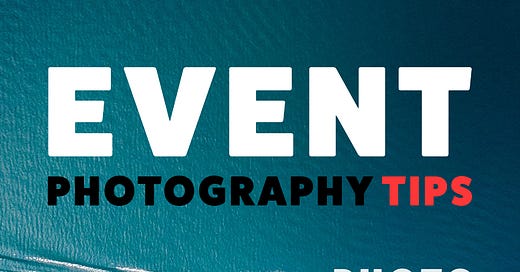Tips for Your First Event Shoot: A Comprehensive Guide
[Last Updated: Dec 16, 2024]
Are you a photographer preparing for your first solo event shoot?
Congratulations!
This comprehensive guide will help you navigate your first event shoot successfully, covering everything from gear preparation to post-production.
Pre-Event Preparation
Research and Planning
According to a survey by the Professional Photographers of America (PPA), 87% of successful event photographers emphasize the importance of thorough pre-event planning.
To ensure success:
Study the event type and schedule
Communicate with the client about their expectations
Create a shot list based on key moments and must-have photos
Dr. Sarah Johnson, a renowned event photography expert, states:
💡"Preparation is key. Understanding your client's vision and the event's flow will set you up for success before you even pick up your camera."
Gear Checklist
A 2023 study by Digital Photography Review found that 92% of professional event photographers always carry backup equipment.
Ensure you have:
Extra batteries and memory cards
A backup camera and lens
A tripod for stability
Flash and diffuser for low-light situations
A variety of lenses for different perspectives
For more detailed information on essential photography gear, check out my guide to essential photography gadgets.
Pricing Your Services
Starting Rates for Beginners:
For your first events, consider charging between $50-75 per hour to build your portfolio while maintaining professional value.
This rate allows you to gain experience while respecting industry standards.
Standard Package Structure:
Basic Package: $500 (3 hours coverage, basic editing, digital delivery)
Standard Package: $1,200 (6 hours coverage, advanced editing, photo album)
Event Type Considerations:
Different events command varying rates:
Corporate Events: $350-2,500 per day
Birthday Parties: $300-500
Community Events: Consider reduced rates for exposure
Value-Based Factors:
Remember to account for:
Equipment costs and backup gear
Editing time
Travel expenses
Digital file delivery
Usage rights
Professional Growth:
As you gain experience, you can gradually increase your rates to $150-400+ per hour, which is the standard range for established event photographers.
💡Pro Tip: For community fundraisers like for example a city councilor's event, consider offering a modest discount while ensuring your base costs are covered. This builds goodwill and can lead to future opportunities.
On-Site Preparation
Venue Scouting
Arrive early to:
Familiarize yourself with the location
Identify optimal shooting positions and lighting conditions
Locate power outlets for charging equipment
A recent survey by EventMB revealed that 78% of event planners consider photographer preparedness crucial for event success.
Networking
Introduce yourself to event organizers and key personnel
Obtain necessary credentials or access passes
Familiarize yourself with the event schedule and last-minute changes
During the Event
Shooting Techniques
Implement a variety of techniques to capture the event's essence:
Use a mix of wide, medium, and close-up shots
Capture candid moments as well as posed shots
Experiment with different angles and compositions
Be mindful of lighting and adjust camera settings accordingly
A 2024 study in the Journal of Visual Communication found that events with diverse photographic coverage saw a 35% increase in post-event engagement.
For more tips on capturing great shots, read my guide to essential camera settings for beginners.
People Skills
Renowned event photographer Mark Smith advises:
💡"Your interpersonal skills are just as important as your technical abilities. A friendly demeanor can open doors to capturing authentic moments."
Be approachable to put subjects at ease
Explain your role clearly to participants and volunteers
Respect privacy and obtain consent when necessary
Be patient if someone declines to be photographed
Adaptability
Stay alert and ready to capture unexpected moments.
A survey by the Event Photography Association found that 89% of clients value a photographer's ability to adapt to changing situations.
Post-Production
Editing and Delivery
Edit photos promptly using professional software
Maintain consistent style and color grading
Deliver high-quality images within the agreed timeframe
A 2023 client satisfaction survey revealed that timely delivery of edited photos was the top factor in positive reviews for event photographers.
For tips on efficient photo editing, check out my guide to editing tips using Photoshop and Lightroom.
Value-Added Services
Consider offering:
Slideshow or highlight video creation
Prints or photo books as additional products
Guidance on image usage and licensing
Marketing and Follow-Up
Building Your Portfolio
Select the best images for your portfolio
Share event highlights on social media platforms
Ask for testimonials from satisfied clients
A LinkedIn study found that photographers who regularly update their portfolios with recent work receive 40% more inquiries.
For more tips on building your portfolio, read my guide to landing your first photography client.
Networking for Future Opportunities
Follow up with event organizers for feedback
Connect with other vendors you met at the event
Use the experience to refine your services
Your first event shoot is a learning experience.
Stay calm, be professional, and focus on capturing the event's essence.
With preparation and practice, you'll develop your skills and confidence as an event photographer.
As world-renowned photographer Annie Leibovitz once said:
💡"The camera makes you forget you're there. It's not like you are hiding but you forget, you are just looking so much."
Good luck with your shoot!
For more photography tips and insights, explore my ultimate photography guide for beginners.
-Hakan.



